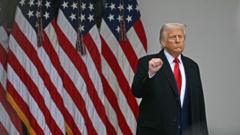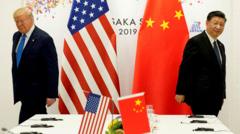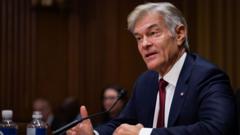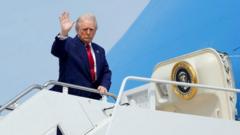Donald Trump’s recent tariff announcement has rattled US stocks and elicited mixed reactions from within the Republican Party. As backlash grows from economic turmoil and political setbacks, the president’s second-term agenda appears to be in jeopardy.
Trump's Second Term Agenda Faces Economic and Political Challenges

Trump's Second Term Agenda Faces Economic and Political Challenges
Amidst Tariff Announcement, Stocks Plummet and Political Support Wanes
In his recent address from the White House Rose Garden, Donald Trump declared April 2 as America’s “liberation day,” announcing sweeping new tariffs on imports. While he expressed confidence in his vision of revitalizing US manufacturing through these measures, the stock market responded with turbulence, signaling potential repercussions as Canada, the EU, and China seem poised to retaliate.
As the situation unfolded, the White House appeared to brace for possible protests, with security measures ramped up ahead of planned demonstrations on Pennsylvania Avenue. First Lady Melania Trump postponed a scheduled White House garden tour, citing security concerns.
During a brief encounter with reporters en route to Florida, Trump attempted to downplay the stock market's decline, asserting that the economy would ultimately thrive as a result of his strategies. However, signs of internal dissent began to emerge among Republican ranks, with figures like Senator Ted Cruz openly questioning the long-term impact of the tariffs on American jobs and businesses.
Abruptly navigating through various domains, Trump’s foreign policy aspirations—particularly regarding conflicts in Gaza and Ukraine—also faced stark realities. The situation in both regions continued to deteriorate, undermining his earlier assertions of achieving peace and alignment with foreign leaders. Even as Trump remains optimistic, experts warn that Russia and other international actors may exploit the US’s concessions in ongoing negotiations.
Furthermore, Trump’s immigration policies, despite their popularity, are facing legal challenges that threaten to stall some deportation efforts. Compounding the complexity, elections in Wisconsin and Florida revealed alarming trends for Republicans, as Democratic candidates gained ground in traditionally conservative areas.
Looking ahead, if the current economic unrest persists and public services suffer due to government cuts, Trump might find his unwavering party support wavering. Historically unyielding, Republican leaders could begin to break away if the mounting pressures prompt significant shifts in public opinion.
While Trump may feel liberated from immediate electoral repercussions, the reality of economic and political challenges looms large—evidencing the unpredictable tides of governance and public sentiment.
As the situation unfolded, the White House appeared to brace for possible protests, with security measures ramped up ahead of planned demonstrations on Pennsylvania Avenue. First Lady Melania Trump postponed a scheduled White House garden tour, citing security concerns.
During a brief encounter with reporters en route to Florida, Trump attempted to downplay the stock market's decline, asserting that the economy would ultimately thrive as a result of his strategies. However, signs of internal dissent began to emerge among Republican ranks, with figures like Senator Ted Cruz openly questioning the long-term impact of the tariffs on American jobs and businesses.
Abruptly navigating through various domains, Trump’s foreign policy aspirations—particularly regarding conflicts in Gaza and Ukraine—also faced stark realities. The situation in both regions continued to deteriorate, undermining his earlier assertions of achieving peace and alignment with foreign leaders. Even as Trump remains optimistic, experts warn that Russia and other international actors may exploit the US’s concessions in ongoing negotiations.
Furthermore, Trump’s immigration policies, despite their popularity, are facing legal challenges that threaten to stall some deportation efforts. Compounding the complexity, elections in Wisconsin and Florida revealed alarming trends for Republicans, as Democratic candidates gained ground in traditionally conservative areas.
Looking ahead, if the current economic unrest persists and public services suffer due to government cuts, Trump might find his unwavering party support wavering. Historically unyielding, Republican leaders could begin to break away if the mounting pressures prompt significant shifts in public opinion.
While Trump may feel liberated from immediate electoral repercussions, the reality of economic and political challenges looms large—evidencing the unpredictable tides of governance and public sentiment.





















